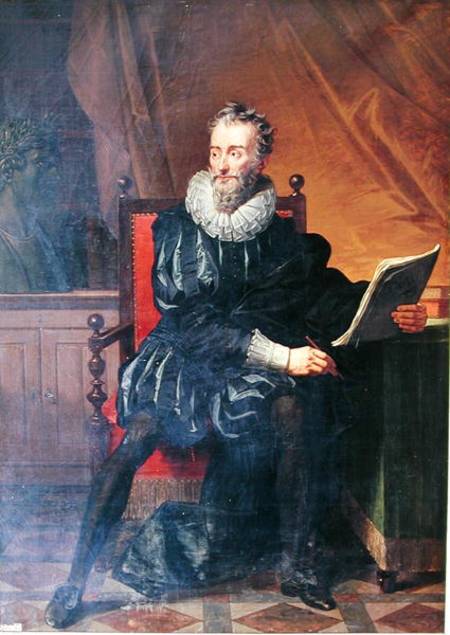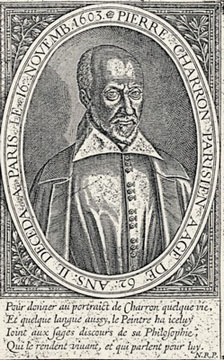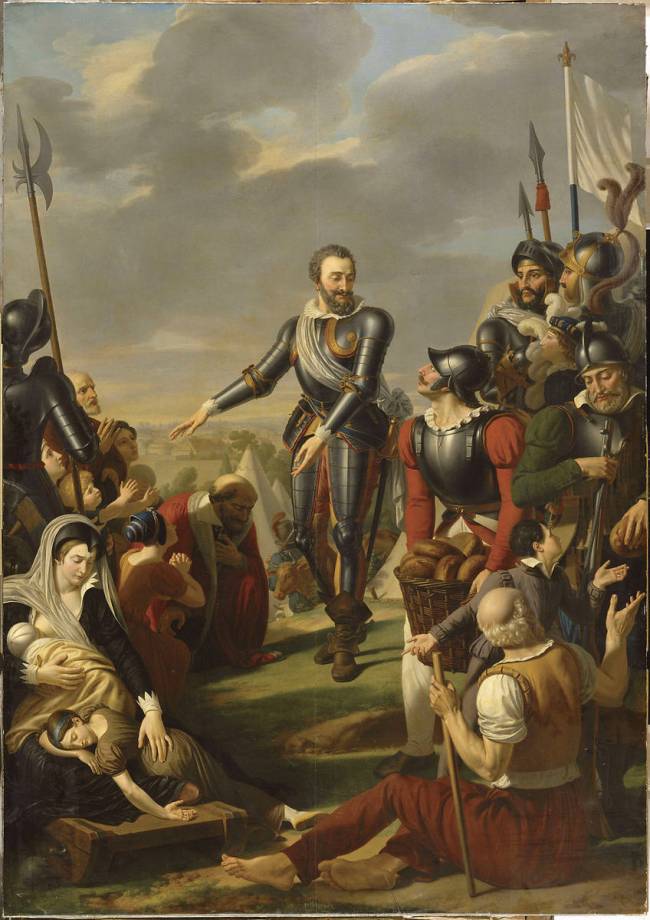|
Guillaume Du Vair
Guillaume du Vair (7 March 1556 – 3 August 1621) was a French bishop, author, lawyer, Magistrate of the Parliament and Keeper of the Seals of France under French king Louis XIII. Life Du Vair was born in Paris. After taking holy orders, he exercised only legal functions for most of his career. However, from 1617 until his death he was Bishop of Lisieux. His reputation is that of a lawyer, a statesman and a man of letters. In 1584, he became counsellor of the ''parlement'' of Paris, and as deputy for Paris to the Estates of the League he pronounced his most famous politico-legal discourse, an argument nominally for the Salic law, but in reality directed against the alienation of the crown of France to the Spanish infanta, which was advocated by the extreme Leaguers. King Henry IV of France acknowledged his services by entrusting him with a special commission as magistrate at Marseille, and made him Master of Requests. In 1595, Vair published his treatise ''De l'éloquence fra ... [...More Info...] [...Related Items...] OR: [Wikipedia] [Google] [Baidu] |
Paris
Paris () is the Capital city, capital and List of communes in France with over 20,000 inhabitants, largest city of France. With an estimated population of 2,048,472 residents in January 2025 in an area of more than , Paris is the List of cities in the European Union by population within city limits, fourth-most populous city in the European Union and the List of cities proper by population density, 30th most densely populated city in the world in 2022. Since the 17th century, Paris has been one of the world's major centres of finance, diplomacy, commerce, culture, Fashion capital, fashion, and gastronomy. Because of its leading role in the French art, arts and Science and technology in France, sciences and its early adoption of extensive street lighting, Paris became known as the City of Light in the 19th century. The City of Paris is the centre of the Île-de-France region, or Paris Region, with an official estimated population of 12,271,794 inhabitants in January 2023, or ... [...More Info...] [...Related Items...] OR: [Wikipedia] [Google] [Baidu] |
See Of Marseille
The Archdiocese of Marseille (Latin: ''Archidioecesis Massiliensis''; French: ''Archidiocèse de Marseille'') is a Latin Church ecclesiastical jurisdiction or archdiocese of the Catholic Church in France."Archdiocese of Marseille" ''''. David M. Cheney. Retrieved January 4, 2017"Metropolitan Archdiocese of Marseille" ''GCatholic.org''. Gabriel Chow. Retrieved February 29, 2016 The archepiscopal see is in the city of |
1621 Deaths
Events January–March * January 12 – Şehzade Mehmed (son of Ahmed I), Şehzade Mehmed, the 15-year old half-brother of Ottoman Sultan Osman II, is put to death by hanging on Osman's orders. Before dying, Mehmed prays aloud that Osman's reign as Sultan be ruined. * January 18 – The Dutch East India Company formally names its fortress at Jayakarta in Indonesia, calling it Jakarta, Batavia. Upon the independence of the Dutch East Indies as Indonesia in 1945, Batavia will be renamed Jakarta. * January 22 – The Tianqi (era), Tianqi era begins in Ming Dynasty China, six months after Zhu Changluo becomes the Taichang Emperor. * January 24 – Twelve days after the murder of Prince Mehmed on orders of Sultan Osman II, Constantinople is hit by bitter winter weather, leading to rioting by persons who believe that the punishment of Osman is the will of Allah. * January 28 – Pope Paul V (Camillo Borghese) dies at the age of 70 after 15 years as Pont ... [...More Info...] [...Related Items...] OR: [Wikipedia] [Google] [Baidu] |
1556 Births
Year 1556 (Roman numerals, MDLVI) was a leap year starting on Wednesday of the Julian calendar. Events January–March * January 4 – In Japan, Saitō Yoshitatsu, the eldest son of Saitō Dōsan, arranges the murders of his two younger brothers, Magoshiro and Kiheiji, and forces his father to flee from the Sagiyama Castle. * January 16 – Charles V, Holy Roman Emperor, Charles V abdicates the thrones of the Spanish Empire (including his colonies in the New World) in favor of his son, Philip II of Spain, Philip II, and retires to a monastery. * January 23 – The 1556 Shaanxi earthquake, Shaanxi earthquake, the deadliest earthquake in history, occurs with its epicenter in Shaanxi province, China; 830,000 people may have been killed. * January 24 – In India, at the Sher Mandal in Delhi, the Mughal Emperor Humayun trips while descending the stairs from his library and strikes the side of his head against a stone step, sustaining a fatal injury. He ne ... [...More Info...] [...Related Items...] OR: [Wikipedia] [Google] [Baidu] |
François De Malherbe
François de Malherbe (, 1555 – 16 October 1628) was a French poet, critic, and translator. Life He was born in Le Locheur (near Caen, Normandie), to a family of standing, although the family's pedigree did not satisfy the heralds in terms of its claims to nobility pre-16th century. Francois the poet was the eldest son of another François de Malherbe, ''conseiller du roi'' in the magistracy of Caen. He himself was elaborately educated at Caen, at Paris, at Heidelberg and at Basel. At the age of twenty-one, preferring arms to the gown, he entered the household of Henri d'Angoulême, the illegitimate son of Henry II, governor of Provence. He served this prince as secretary in Provence, and married there in 1581. It seems that he wrote verses at this period, but, to judge from a quotation of Tallemant des Réaux, they must have been very bad ones. His patron died when Malherbe was on a visit in his native province, and for a time he had no particular employment, though by some ... [...More Info...] [...Related Items...] OR: [Wikipedia] [Google] [Baidu] |
Jansenism
Jansenism was a 17th- and 18th-century Christian theology, theological movement within Roman Catholicism, primarily active in Kingdom of France, France, which arose as an attempt to reconcile the theological concepts of Free will in theology, free will and Grace in Christianity, divine grace in response to certain developments in the Catholic Church, but later developed political and philosophical aspects in opposition to Absolutism (European history), royal absolutism. It was based on the ideas of Cornelius Jansen, (1585-1638), a Dutch bishop, and his book ''Augustinus (Jansenist book), Augustinus''. Jansenists believed that God’s grace was the only way to salvation and that human free will had no role. Jansenists provoked lively debates, particularly in France, where five propositions, including the doctrines of limited atonement and irresistible grace, were extracted from the work and declared heretical by theologians hostile to Jansen. In 1653, Pope Innocent X condemned f ... [...More Info...] [...Related Items...] OR: [Wikipedia] [Google] [Baidu] |
Blaise Pascal
Blaise Pascal (19June 162319August 1662) was a French mathematician, physicist, inventor, philosopher, and Catholic Church, Catholic writer. Pascal was a child prodigy who was educated by his father, a tax collector in Rouen. His earliest mathematical work was on projective geometry; he wrote a significant treatise on the subject of conic sections at the age of 16. He later corresponded with Pierre de Fermat on probability theory, strongly influencing the development of modern economics and social sciences, social science. In 1642, he started some pioneering work on calculating machines (called Pascal's calculators and later Pascalines), establishing him as one of the first two inventors of the mechanical calculator. Like his contemporary René Descartes, Pascal was also a pioneer in the natural and applied sciences. Pascal wrote in defense of the scientific method and produced several controversial results. He made important contributions to the study of fluids, and clari ... [...More Info...] [...Related Items...] OR: [Wikipedia] [Google] [Baidu] |
Ferdinand Brunetière
Ferdinand Vincent-de-Paul Marie Brunetière (; 19 July 1849 – 9 December 1906) was a French writer and critic. Personal and public life Early years Brunetière was born in Toulon, Var, Provence. After school at Marseille, he studied in Paris at the Lycée Louis-le-Grand. Desiring a teaching career, he entered for examination at the École Normale Supérieure, but failed, and the outbreak of war in 1870 prevented him trying again. He turned to private tuition and literary criticism. After the publication of successful articles in the ''Revue Bleue'', he became connected with the '' Revue des Deux Mondes'', first as contributor, then as secretary and sub-editor, and finally, in 1893, as principal editor. Career In 1886 Brunetière was appointed professor of French language and literature at the École Normale, a singular honour for one who had not passed through the academic mill; and later he presided with distinction over various conferences at the Sorbonne and elsewhere. H ... [...More Info...] [...Related Items...] OR: [Wikipedia] [Google] [Baidu] |
Pierre Charron
Pierre Charron (; 1541 – 16 November 1603) was a French Catholic theologian and major contributor to the new thought of the 17th century. He is remembered for his controversial form of skepticism and his separation of ethics from religion as an independent philosophical discipline. Biography Pierre Charron was born in Paris, one of the twenty-five children of a bookseller. After studying law at Orléans and Bourges he practiced as an advocate, for a few years. He then entered the church and soon became a popular priest, rising to become a canon. He moved to the southwest of France, invited by Arnaud de Pontac, Bishop of Bazas. He was appointed priest in ordinary to Marguerite de Valois, wife of Henry IV of Navarre. In about 1588, Charron decided to become a monk, but being rejected by both the Carthusians and the Celestines, he returned to his old profession. He delivered a course of sermons at Angers, and in the next year moved to Bordeaux, where he formed a famous frien ... [...More Info...] [...Related Items...] OR: [Wikipedia] [Google] [Baidu] |
Stoicism
Stoicism is a school of Hellenistic philosophy that flourished in ancient Greece and Rome. The Stoics believed that the universe operated according to reason, ''i.e.'' by a God which is immersed in nature itself. Of all the schools of ancient philosophy, Stoicism made the greatest claim to being utterly systematic. The Stoics provided a unified account of the world, constructed from ideals of logic, monistic physics, and naturalistic ethics. These three ideals constitute virtue which is necessary for 'living a well reasoned life', seeing as they are all parts of a logos, or philosophical discourse, which includes the mind's rational dialogue with itself. Stoicism was founded in the ancient Agora of Athens by Zeno of Citium around 300 BC, and flourished throughout the Greco-Roman world until the 3rd century AD, and among its adherents was Roman Emperor Marcus Aurelius. Along with Aristotelian term logic, the system of propositional logic developed by the Stoics was one of th ... [...More Info...] [...Related Items...] OR: [Wikipedia] [Google] [Baidu] |
Siege Of Paris (1590)
The siege of Paris (7 May – 30 August 1590)Knecht, ''Wars of Religion'' p. 65 took place during the French Wars of Religion when the French Royal Army under Henry of Navarre, and supported by the Huguenots, failed to capture the city of Paris from the Catholic League. Paris was finally relieved from the siege by an international Catholic-Spanish army under the command of Alexander Farnese, Duke of Parma. Background After his victory over the Catholic forces commanded by Charles, Duke of Mayenne and Charles of Guise, Duke of Aumale at the Battle of Ivry on 14 March, Henry of Navarre advanced with his troops on his main objective of Paris, possession of which would allow him to confirm his contested claim to the French throne. Paris at the time was a large walled city of around 200,000–220,000 people. Siege On 7 May, Henry's army surrounded the city, imposing a blockade and burnt windmills to prevent food from reaching Paris. Henry had at this point only around 12,000 ... [...More Info...] [...Related Items...] OR: [Wikipedia] [Google] [Baidu] |
Charles Cotton
Charles Cotton (28 April 1630 – 16 February 1687) was an English poet and writer, best known for translating the work of Michel de Montaigne from French, for his contributions to ''The Compleat Angler'', and for the influential ''The Compleat Gamester'' attributed to him. Early life He was born in Alstonefield, Staffordshire, at Beresford Hall, near the Derbyshire Peak District. His father, Charles Cotton the Elder, was a friend of Ben Jonson, John Selden, Sir Henry Wotton and Izaak Walton. The son was apparently not sent to university, but was tutored by Ralph Rawson, one of the fellows ejected from Brasenose College, Oxford, in 1648. Cotton travelled in France and perhaps in Italy, and at the age of twenty-eight he succeeded to an estate greatly encumbered by lawsuits during his father's lifetime. Like many Royalist gentlemen after the English Civil War the rest of his life was spent chiefly in quiet country pursuits, in Cotton's case in the Peak District and North Stafford ... [...More Info...] [...Related Items...] OR: [Wikipedia] [Google] [Baidu] |








